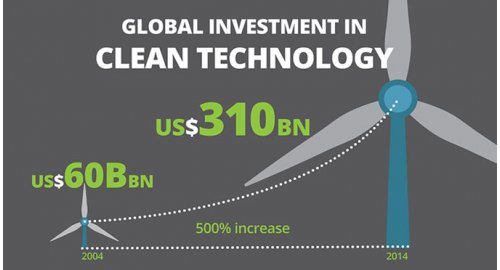Chennai Refocus Paris; Businesses Ready To Invest In Low Carbon Economy
Damandeep Singh
As the devastation in Chennai from unprecedented rainfall reminds the global leaders negotiating a ‘ambitious’ Paris climate deal the threat from climate change is real and present, France reached out to India in the midst of frantic negotiations. “Flooding in India’s Chennai region has taken a tragic toll. I want to express France’s solidarity with all those affected by this tragedy. The unprecedented magnitude of the flooding confirms yet again that we no longer have time. We must take concrete and urgent action against climate disruption,” said French foreign minister Laurent Fabius who is also presiding over the conference.
There is hope that this tragic reminder of nature’s fury might will help refocus negotiations as the first week draws to a close.
However, the road to a path breaking climate pact seem is still bumpy with the familiar fault lines gradually reappearing. Disagreement over application of the principle of Common but Differentiated Responsibilities (CBDR) has exposed the differences between developed and developing countries, which, once again threaten the outcome of the summit. The developing country group, with India in a leadership position, made a strong formal statement against any attempt by developed countries to put every nation on equal footing to contribute to climate finance. Nozipho Mxakato-Diseko, ambassador from South Africa and chair of the G77+China group, said, “Any attempt to replace the core obligation of developed countries to provide financial support to developing countries with a number of arbitrarily identified economic conditions is a violation of the rules-based multilateral process and threatens an outcome here in Paris.”
The Indian delegation, labelled by many as the spoiler, felt the mood was changing. There is a ‘constructive spirit’ emerging said one India negotiator who did not want to be identified. Contentious issues remain the same, as UNFCCC secretary general Christiana Figueres, has also warned. India delegations still fears the weakening of the framework convention with finance and technology remain the core elements for India.
On the issue of developed countries trying to do away with the differentiation between developed and developing countries, Gurdial Singh Nijar of Malaysia said, “You (the developed countries) grew to this level of prosperity because you burnt fossil fuel at an unabated rate… You created the problem and now you say that we want you to share—on an equal basis—the responsibility.”
In the backdrop of India being targeted by western media for its plan to increase using coal to meet its energy requirement and Secretary of State John Kerry’s calling India a “challenge” in the Paris climate change talks, US Special Envoy for Climate Change Todd Stern displayed solidarity stating that US and India have a strong history of working “collaboratively”. “I understand where they are coming from and they (India) understand where we are coming from. The art that goes on here is to try to find solutions that are both effective and both sides can go home and be comfortable. We are in that process,” he said. Defying the claims of India getting isolated in Paris, it also found support from Pa Ousman, environment minister of Gambia, a prominent representative of the LDC group “India is a developing country with millions of poor people. Economic situation in some parts of India is the same as LDCs. We need to understand where India is coming from and must appreciate the efforts of the (Indian) government.”
“We were frankly surprised by the negative media on coal at the beginning, but there now appears to be a greater understanding of India’s position,” the negotiator said. There also appears to be some movement on global stock-taking, he added but India was looking for greater comfort on finance. Addressing a press conference Susheel Kumar, India’s chief negotiator said that India did not agree with the nomenclature of donor. He said despite falling renewable energy prices, it was still out of reach for poor and called for a clear pricing signal from the market forces on further reductions. He said there was no problem with global stock taking even on a five year cycle.
How each country negotiates in Paris and what stands they take depend strongly on the economic and political situations back at home. Acknowledging this reality U.N. Climate Chief Figueres, “Let us be very clear, they’re doing it for what I think is a much more powerful political driving force, which is for the benefit of their own economy. And I think that is really the story here. They have understood that this is actually in their own interest. There is nothing more powerful than you, me or any country working in their own interest.”
A clear distinction this year has been the increased role of business focussed groups that have demanded they be included in the calculations. Some have stepped in and are offering solutions.
“Here in Paris, countries have the opportunity to unlock trillions of dollars in low- carbon finance. While the focus of negotiations is understandably on mobilising the $100 billion a year in climate finance pledged in Copenhagen, Parties must ensure they do not lose sight of the much larger prize that is within their grasp,” said Nigel Topping CEO of We Mean Business, a coalition representing seven business NGOs.
For business and investors, in the real economy trillions of dollars sit ready to invest in low-carbon opportunities if the right incentives are created, he added. This is true in both developed and developing countries. The Paris agreement and the national low-carbon investment perspectives that Parties have already submitted (otherwise known as Intended Nationally Determined Contributions) provide the means for creating these incentives.
In the case of the Paris agreement, business and investors need a robust and ambitious deal that clearly lays down a trajectory of global low-carbon economic development. This requires an unambiguous and ambitious long-term goal, a five-year review and ratchet mechanism starting before 2020, and shared rules on transparency of action.

